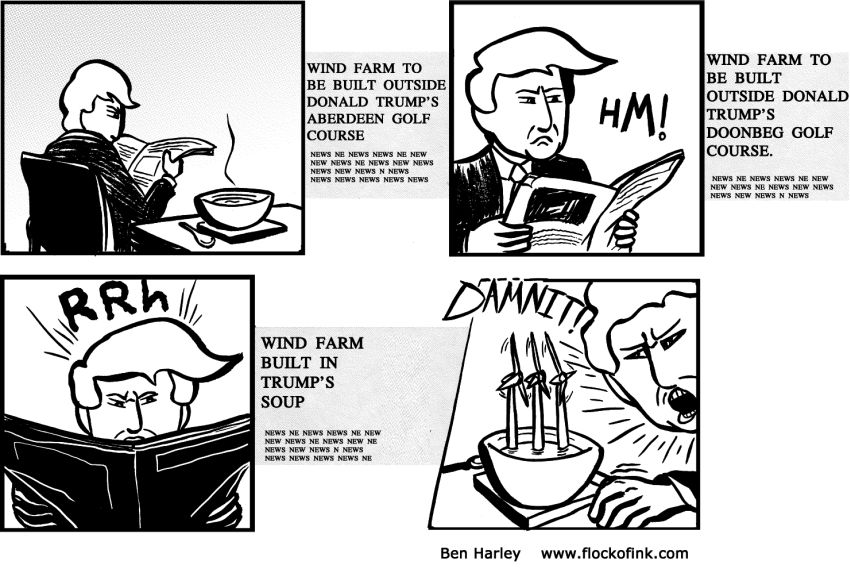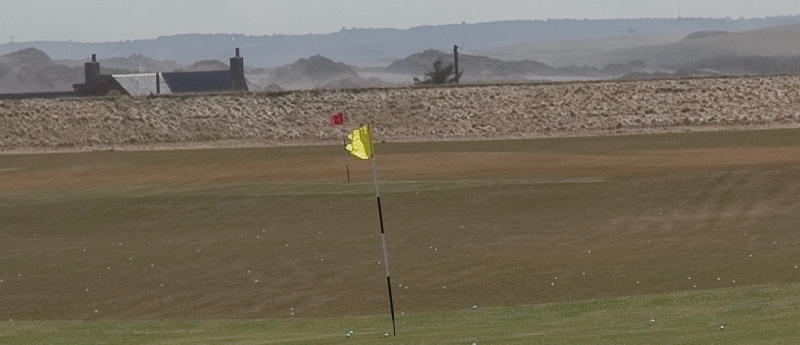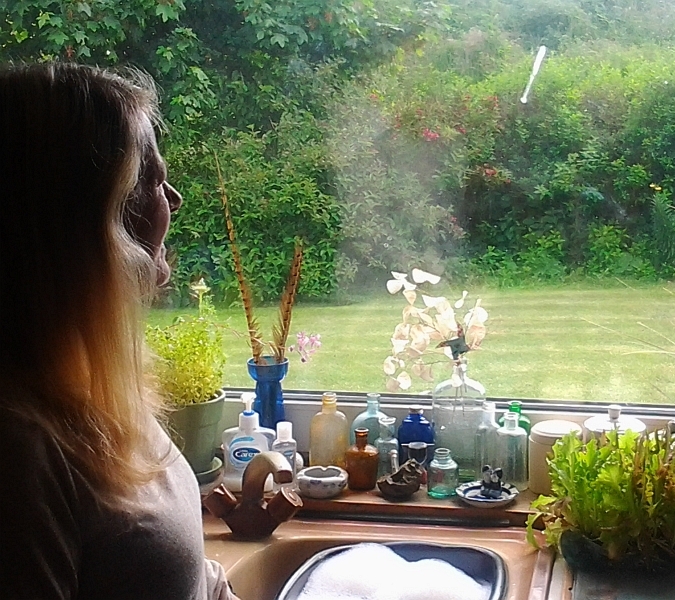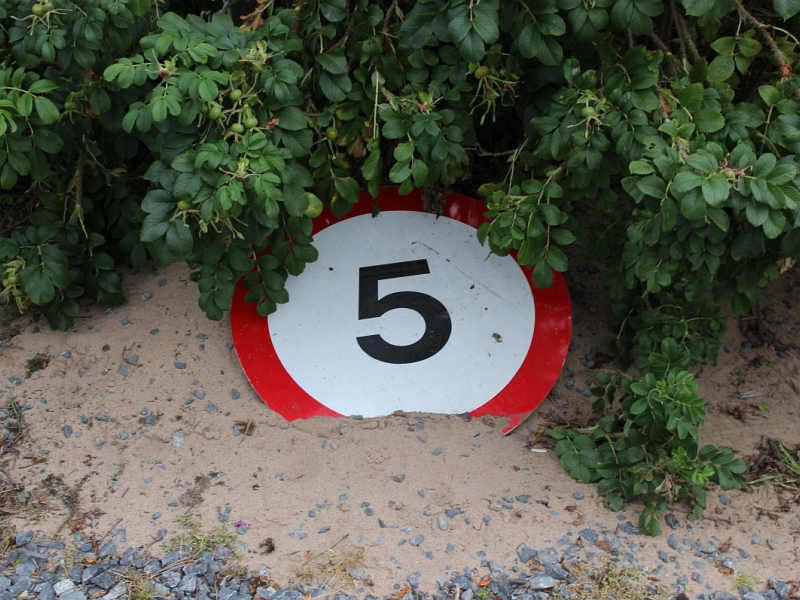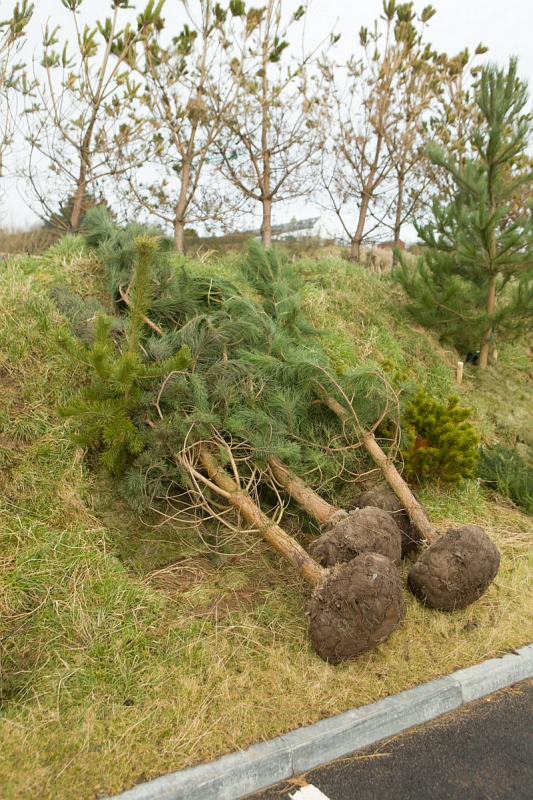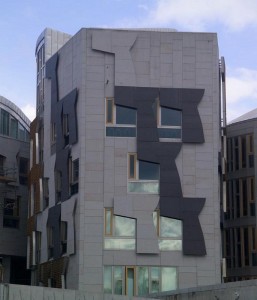You might think that if someone came onto your land, damaged goods and removed property – and you had a video which could hold vital evidence, the police would want to look at the tape. You would be wrong, if you were called David Milne and living on the Menie Estate. On behalf of David Milne, Suzanne Kelly tried to find out why there was no follow up and why no one would so much as touch the videotape.
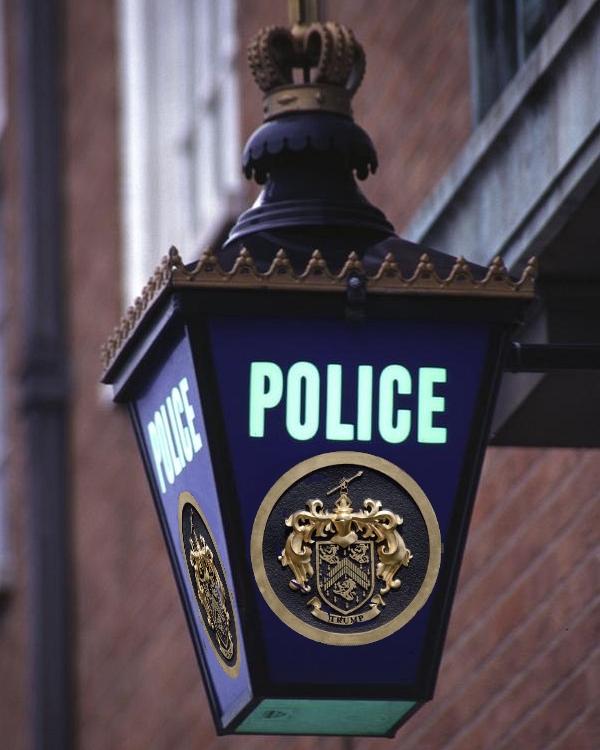 After waiting several months for information requests and a Scottish Information Commissioner review, all we know is the information is too sensitive and too secret to reveal.
After waiting several months for information requests and a Scottish Information Commissioner review, all we know is the information is too sensitive and too secret to reveal.
Put yourself in David Milne’s place. You’re living in a beautiful, protected environment; a sparsely populated coastal area north of Aberdeen. Then, Donald Trump arrives, with plans for a massive development (two golf courses, hundreds of homes, a clubhouse and hotel), and includes the homes and property of you and your neighbours in his development plan.
The national and local governments welcome Trump, and his promises, with open arms.
Next, the police create a special policy for policing the area; they claim to want to deter and detect crime at Menie. Security Guards then appear, randomly demanding identification from fellow residents. They spy on properties from their vans, and signs warning of CCTV recording go up.
Gates are erected and locked shut. One of your main access roads, formerly a well maintained dirt road is turned into an impassable rutted mess, undoubtedly due in part to construction vehicles. Months go by before it is repaired.
Next, Trump claims in the press that his property is being vandalised (which makes you wonder just why his security guards are watching the residents while vandals caused damage).
Police start to visit your neighbours, the Forbes Family, and eventually arrest Michael Forbes for taking property markers from land he is using and believes to be his – he is charged, but the case is later dropped.
Journalists you’ve met and have talked with are arrested and charged with ‘breach of the peace’. Their offence seems to have been asking the site manager when the residents can expect their water back on – it had been off for 7 days.
Photographer Alicia Bruce is dissuaded from making a police complaint although a violent-tempered Trump groundskeeper has threatened her and threatened to smash her camera.
In October 2010 someone has gone onto your property, caused damage, and removed property; someone who just might be linked to the Trump development – which soon erects a cheap fence and sends you the bill for it. You have a video which shows some, or part of, the potentially criminal activity.
You report the matter to the police. Surely, given their area policing policy, they will be swiftly investigating, and bringing someone to justice.
Only, the police are letting the matter drop.
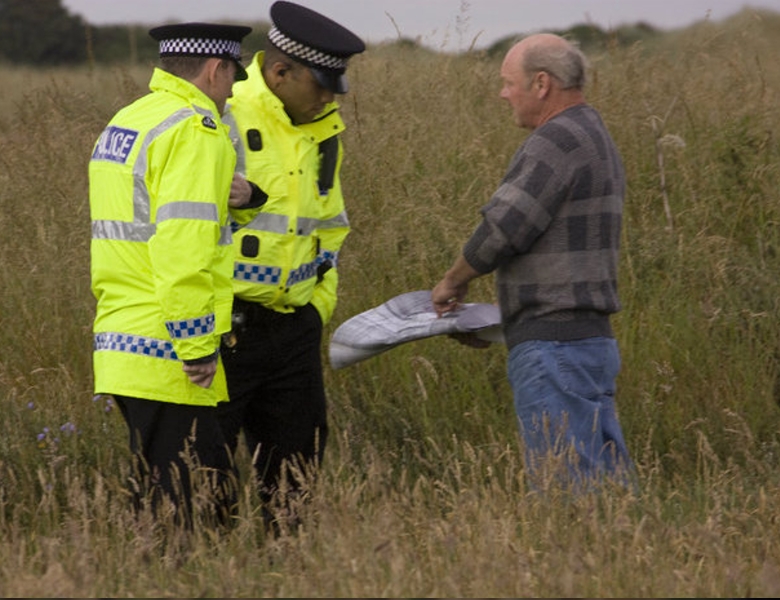 Who decided the incident wasn’t worth following up? Why wouldn’t the police look at a video showing the possible criminal activity, if they were willing to charge Forbes with theft and journalists with breach of the peace? How can a petty removal and return of border flags be worth an arrest, and actual damage to your property not be important?
Who decided the incident wasn’t worth following up? Why wouldn’t the police look at a video showing the possible criminal activity, if they were willing to charge Forbes with theft and journalists with breach of the peace? How can a petty removal and return of border flags be worth an arrest, and actual damage to your property not be important?
You want answers, and a freedom of information request is launched with Grampian Police. The police then decide to answer some, but far from all of your questions.
You ask them to reconsider; you ask them for an internal review. You still don’t get the answers.
The next step is to approach the Scottish Information Commissioner’s office. Months go by, and one or two emails ask further clarifications of you. Then the decision comes out.
There is some good news – information will (eventually) be released concerning correspondence on area incidents. But the reasoning and procedures used to stop the police investigation are not forthcoming. This is pretty much the end of the line for most of your questions, and back to square one for other questions.
What the Commissioner Found (or didn’t find)
The decision the Information Commissioner came to can be found here. It is appreciated the law says that no information can be released which might reveal police procedure or might undermine public confidence in the police. However, several points arise when reading the decision.
1. Right to reply while the investigation was live
Should there have been a right to comment on the Police Scotland representations when the decision was still in the draft stage? In an investigation made by the Scottish Information Commissioner regarding Stewart Milne, there were regular updates, and opportunities to comment on Aberdeen City Council’s representations to the Commissioner.
If there hadn’t been this opportunity, the city’s claim the information was too expensive to get would have been allowed to stand – this claim was disproved by keeping the petitioner informed of the council’s claims, and allowing the petitioner to comment on them.
Other opportunities for involvement in the Commissioner’s investigation were reflected in passages such as:
“If you would like to make any further comment regarding the Council’s reliance on section 33(1)(b) of FOISA for this information then please feel free to. Any comments you make will be taken into consideration in reaching a decision on this case”.
http://www.itspublicknowledge.info/ApplicationsandDecisions/Decisions/2011/201100822.aspx
and
“In order for me to thoroughly investigate your case I would appreciate it if you could provide me with a submission as to why you consider that there is a public interest in disclosure of information.” (IBID)
2. No info blackout?
Relevant information was found exempt from disclosure because it contained third party data. Surely some form of redaction of this personal third party data might have been possible – local and national governments issue ‘redacted’ documents (documents with passages blocked out) all the time.
This suggestion could have been made to the Commissioner during the investigation. It might or might not have been acted on, but the case for redacting the ‘sensitive’ information could have been made.
3. Public Image: Limited
With regard to the need to maintain ‘public confidence’, is it possible that the lack of transparency is exactly what is eroding confidence. When it seems, in cases such as this one, that laws are being applied unevenly – particularly where there is a specified local policing strategy in place, you might think the police would be eager to explain apparent disparity.
4. Investigation? What investigation?
There are parts of the decision which call for almost line for line comment; below are some points (marked with letters in square brackets) and relevant comments.
In Points 19 through 25 of the Decision, it is established that the
[a]“…withheld information was held in files of investigations into allegations of criminal conduct which were carried out under the statutory obligations of the Police (Scotland) Act 1967″ and that the Commissioner accepts that the police
[b] “held the withheld information for the purpose of an investigation…” and therefore she
[c] “must conclude that the exemptions apply.” The police claimed that:
[d] “disclosure of the requested information would entail releasing information gathered for the purposes of an investigation, which would involve details of investigatory processes and other issues considered as a matter of course during an investigation” and they also claimed
[e] “disclosure of the information would reveal processes showing how allegations are investigated which could prove useful to criminals and those intending committing a crime.”
[a,b] Had there been the opportunity to comment during the investigation, it would have been pointed out that no investigation took place – how could there have been an investigation when potentially crucial videotape evidence was not examined? Therefore Police Scotland’s claim its data was “.. for the purposes of an investigation” looks just a bit shaky.
As they had written on 29 March 2013:-
“The solicitor gave advice to the officers dealing with the matter and based on his advice, they made the decision that the incident was not a criminal matter.”
[c] Perhaps the Information Commissioner would have still sided with the police, but there should have been a chance to throw reasonable doubt on their reason for withholding the information.
[d] It can be argued that the information the police had was not gathered for the purposes of an investigation; the evidence they have must be largely what David Milne gave to them directly. This refusing potential evidence is a move which hopefully is without precedent.
The refusal leads to the question: Was a decision taken that the special policing policy invented expressly for the Menie Estate did not apply to David Milne but only to the developer? The policy was to:-
“Maximise safety; minimise disruption; facilitate lawful protest; deter, detect, detain and report those responsible for unlawful behaviour.”
Disclosure of the thinking behind the lack of investigation seems clearly to be in the public’s interest – if laws are not being enforced and/or criminal activity is not being investigated, the public would have serious concern. At present, it certainly looks as if Justice decided to peek out from under her blindfold and engage in a bit of favouritism.
[e] It seems a bit of a stretch to claim that telling Milne why his vandalised property didn’t warrant proper investigation would jeopardise Police Scotland’s secret investigative procedures and help criminals.
At present, there are dozens of police documentaries and docu-dramas, from Crimewatch UK to several specific programmes which give a great deal of information on how the UK and Scottish police investigate (or do not investigate in this instance) criminal activity.
As well as a sizable list of crime documentary/procedural shows, there are books such as ‘The Police Procedural’ by George N Dove – which leaves little left to be revealed on points of police procedure.
Stating at Point 30 of the Commissioner’s decision that:
“it will not be in the public interest to disclose information if this would undermine the confidence of the public in that part of the justice system or the confidence of police officers gathering information for such investigations”
There was no investigation, so it is hard to see how this point of law is applicable in this situation. With all due respect, withholding information as to why this incident was not fully investigated is precisely what might erode public confidence in the police.
5. Whodunnit?
At Point 36 of the Commissioner’s Decision it again becomes regrettable that there was no opportunity to comment on the draft decision before its release. This point states
“… the decision not to pursue a prosecution was not made by their solicitor, but by the officers investigating the matter who considered that the incident was not a criminal matter.”
This brings up two important issues.
Firstly, there is a large contradiction in what was originally released by the police and the Information Commissioner’s conclusion. The Commissioner has been advised at some point in her investigation that it was police officers who decided the matter was not a criminal one. However, on 29 March the police wrote in a letter:-
“ The solicitor gave advice to the officers dealing with the matter and based on his advice, they made the decision that the incident was not a criminal matter.”
This again reinforces that there was no investigation – so the reasons given for not releasing the desired information because it was the subject of an investigation is something of a Catch 22. It would be very interesting to know if it was on the solicitor’s advice or on the police’s own judgment that the video was refused.
6. Policy
As previously raised, the police invented a specific, Menie-based strategy. The following question had been put to Police Scotland in the original request:-
“…in Spring 2009, following the announcement of a number of strategic economic and infrastructure developments, Grampian Police established a short life Critical Incident Preparation Group (CIPG).
“… a generic, local strategy, relevant to Menie Estate (was) developed. This has been determined as; Maximise safety; minimise disruption; facilitate lawful protest; deter, detect, detain and report those responsible for unlawful behaviour.”
In light of this stated policy, do the police consider that its handling of the incident at the Milne property in October 2010 fits in with the strategy of ‘…detect, detain, and report those responsible for unlawful behaviour’? If the policy was not applied to the trespass, theft and damage at the Milne property, then whose decision was it that the policy did not apply?
In any event, it seems clear that the police do not want to explain why this policy was not used to protect Mr Milne.
Later on, as Trump operatives moved onto land that was subject of a civil dispute, police enabled Trump’s employees to take the law into their own hands, enter disputed areas and even cause property damage, while helpless Forbes was told he couldn’t do anything to stop it.
In that case it is possible the police were not correctly applying law and arguably going against their own invented local code for most of these incidents. As the saying goes, “there is one law for the rich, and another for the poor”.
8. Of No Interest (?)
At Point 24 the Decision notes the Police claim “there was no significant wider public interest”. This is simply untrue, not least because of the outcry at the treatment meted out to Menie resident Michael Forbes, who was initially charged with theft for taking marker flags out of his field, which he then handed over.
The arrests of journalists Anthony Baxter and Richard Phinney also throw light on what confidence in the police the public may have, and certainly these incidents show there is local, national and international interest in policing at Menie. Point 24 should not have been allowed to stand without my right to reply as applicant.
9. Contradiction?
David Milne had also accomplished the impressive feat of getting some 19,500 people to sign a petition to Holyrood asking for a public inquiry into the goings-on at Menie. This was, unsurprisingly, turned down: the Petitions Committee’s procedure was to ask the agencies in the firing line if they wanted to be investigated. To a one, they said no.
This lack of transparency regarding the Milne property vandalism brings back the spectre of the aborted public inquiry: at present we’re being told information can’t be released, but at the time the inquiry was possible, the police wrote that there was nothing left to disclose.
Despite that claim to the Petitions Committee, there certainly seems to be fair amount of information regarding Mr Milne’s case which the police haven’t, and won’t disclose after all.
This rather raises some interesting questions about the accuracy of the police representation to the Petitions Committee, which reads in part:-
“Police Scotland remain completely neutral on all matters concerning the development of the Menie Project with our focus remaining on ensuring that officers approach their duties with integrity, fairness and respect for all parties involved, and only taking action where appropriate to address behaviour which breaches the criminal law.
“It is our position that all officers involved in the policing response connected with this development have carried out their duties in an impartial and transparent manner.”
Some people beg to differ.
Flaw and Order
At the heart of the refusal to supply information there is the carte blanche, the all-encompassing get out clause for FOI requests put to the police: it seems releasing this kind of information just might “undermine the confidence of the public in that part of the justice system.”
Recent restructuring of Scotland’s regional police forces into Police Scotland spelled the end of Grampian Police. This had to be a good thing; the local police force didn’t exactly have an untarnished recent past. Its former top policeman Ian Patterson is going to prison for sex offences.
Two officers of what was the Northern Constabulary were recently convicted of a bizarre, wholly unlawful abuse of two troubled teenage girls, taken from their care home to a remote farm, frightened and forced to walk without shoes through horse manure.
But it was a new low for the police force of Grampian and Scotland when the documentary ‘you’ve been trumped’ captured the moment that Baxter and Phinney were abruptly, roughly – and to any rational person’s judgment – unjustly arrested at the Menie Estate. The arrest shocked the world, and the documentary showing life at Menie has travelled the world, winning awards.
The Police Scotland reorganisation was meant to improve the police’s operations and public image, but scepticism continues.
Judging from the response David Milne had to a freedom of information request, this scepticism, if not mistrust and lack of confidence in Police Scotland, may be around for a good long while yet.
In an article on 23 November 2013, the Herald raises some doubts:-
“One national force, it was argued, would not just save on costs, but would also improve accountability. This has not transpired, at least on the evidence of a refusal by Police Scotland and the Scottish Government to release details of the KPIs being used by the new force. As we reported this week, both bodies rejected our Freedom of Information request on the topic.”
http://www.heraldscotland.com/comment/herald-view/police-accountability-at-important-junction.22755317
The Herald wasn’t able to obtain information on how the police operate, and so largely it proved for Milne.
Yet the Information Commissioner has partially sided with Milne. He will not be getting all of the information (or indeed much of the facts sought), but he will be receiving – in January – further details about police cautions issued at Menie.
The police decided that when asked for information ‘since 2010’ they could merely give information from 2011, even though the original information request told the police to ask questions if they were not sure what was meant. This information will be of some use, but it won’t really address the big picture.
If the idea is to maintain confidence in Police Scotland, perhaps accountability and transparency (as the Sunday Herald article suggests) would be a good start.
- Comments enabled – see comments box below. Note, all comments will be moderated.



